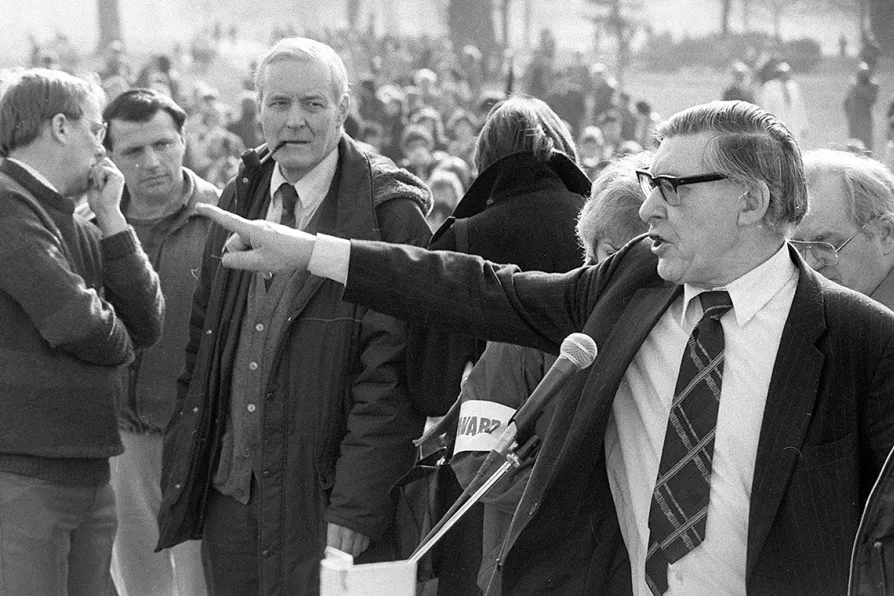CHRISTOPHE DOMEC speaks to CHRIS SMALLS, who helped set up the Amazon Labor Union, on how weak leadership debilitates union activism and dilutes their purpose
KATE CLARK recalls an occasion when the president of the Scottish National Union of Mineworkers might just have saved a Chilean prisoner’s life

 Mick McGahey, vice-president of the National Union of Mineworkers addresses a rally, attended by MP Tony Benn, February 14, 1985
Mick McGahey, vice-president of the National Union of Mineworkers addresses a rally, attended by MP Tony Benn, February 14, 1985
READING about Mick McGahey and his new commemorative bust in the Scottish Parliament, I recalled one of the times I met the great man.
It was some time in the late 1970s. I was active in Edinburgh’s branch of the Chile Solidarity Campaign, having got out of Chile in 1974 together with my husband Ricardo after gaining his release from prison following the September 1973 military coup there.
General Augusto Pinochet’s repression against the Chilean Communist Party became particularly harsh in 1976-77 and several of its top leadership were in jail or disappeared.
We asked Mick McGahey, who was president of the Scottish National Union of Mineworkers, if he would be prepared to telephone the minister of justice in Chile to urge the release of several comrades. I was to be the interpreter, once we had managed to get the minister on the line.
We went down to Mick’s office at the Scottish NUM headquarters on London Road and set up the call. We managed to get the Chilean minister to come on the line, and Mick, in his clear, deep, unhurried voice proceeded to tell the Junta’s so-called minister that the National Union of Mineworkers was deeply concerned about the fate of the prisoners — some of them miners — whose names we had given him. Mick would pause at convenient intervals so that I could translate his words.
I don’t know whether this action had any effect. But it would certainly have shown the junta’s officials that important organisations abroad were concerned and were keeping watch on the terrible crimes they were committing against trades unionists in Chile. Mick McGahey’s telephone call that day may well have saved somebody’s life.
Mick McGahey also chaired a mass meeting in Leith at which the Chilean Communist Party leader, Luis Corvalan, spoke. Corvalan had recently been freed from the notorious Dawson Island near Antarctica, after the USSR, which had campaigned hard for his release, arranged a prisoner swap, exchanging him for the Soviet dissident Bukovsky.
Leith Town Hall was packed, Corvalan’s welcome was ecstatic, and Mick chaired the meeting with his usual comradely attitude and warm internationalist words.
Mick’s chairing, which I presenced several other times during those years, was nothing short of brilliant. He had a huge personal presence and command over proceedings which never seemed to fail him.
In a different society than our own, people like Mick McGahey would be feted, lauded and given voice in the mass media. How often do we ever hear leading trades unionists on our media? Hardly ever. Yet they represent many thousands of people.
McGahey’s bust in the Scottish Parliament is a fitting and timely tribute to a great working-class hero and unwavering internationalist. I shall always treasure the miner’s davy lamp he gave me.

The Home Secretary’s recent letter suggests the Labour government may finally deliver on its nine-year manifesto commitment, writes KATE FLANNERY, but we must move quickly: as recently as 2024 Northumbria police destroyed miners’ strike documents

RON JACOBS welcomes an investigation of the murders of US leftist activists that tells the story of a solidarity movement in Chile











